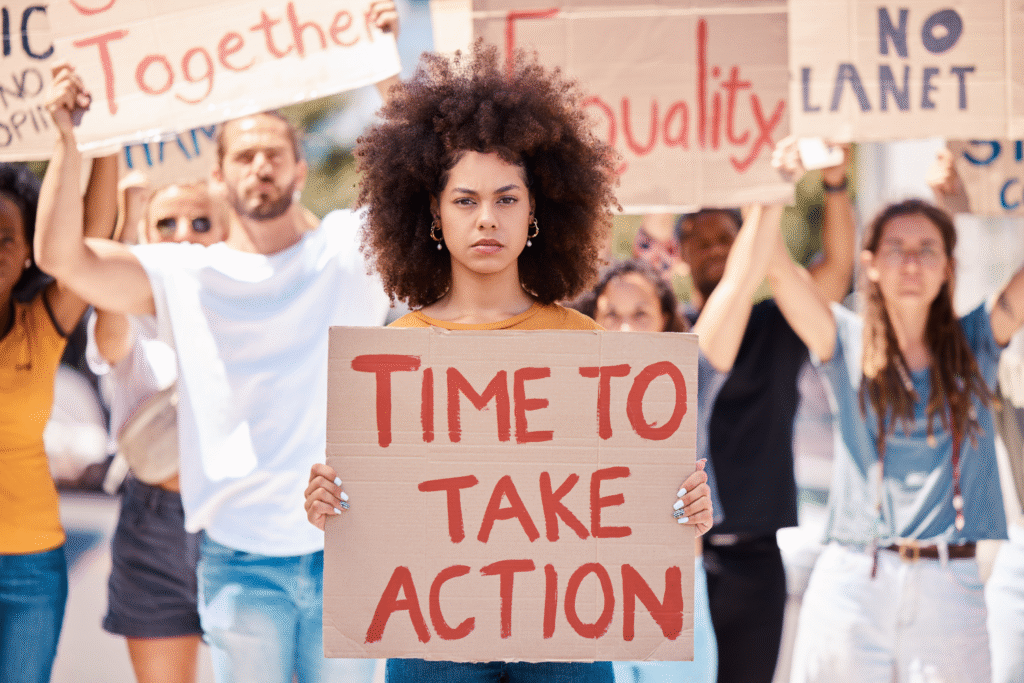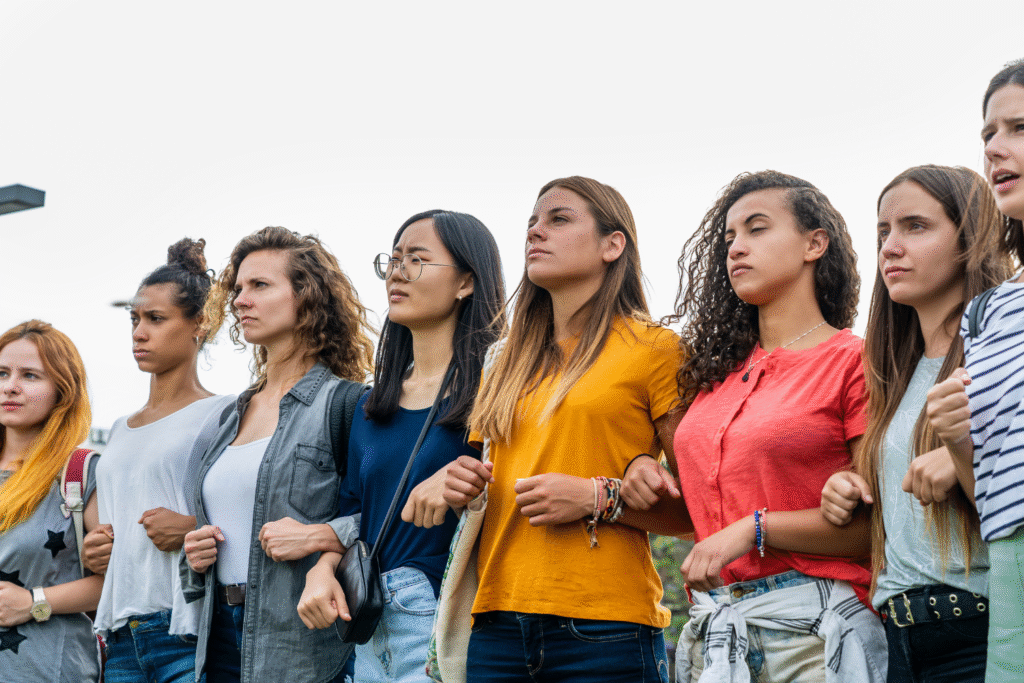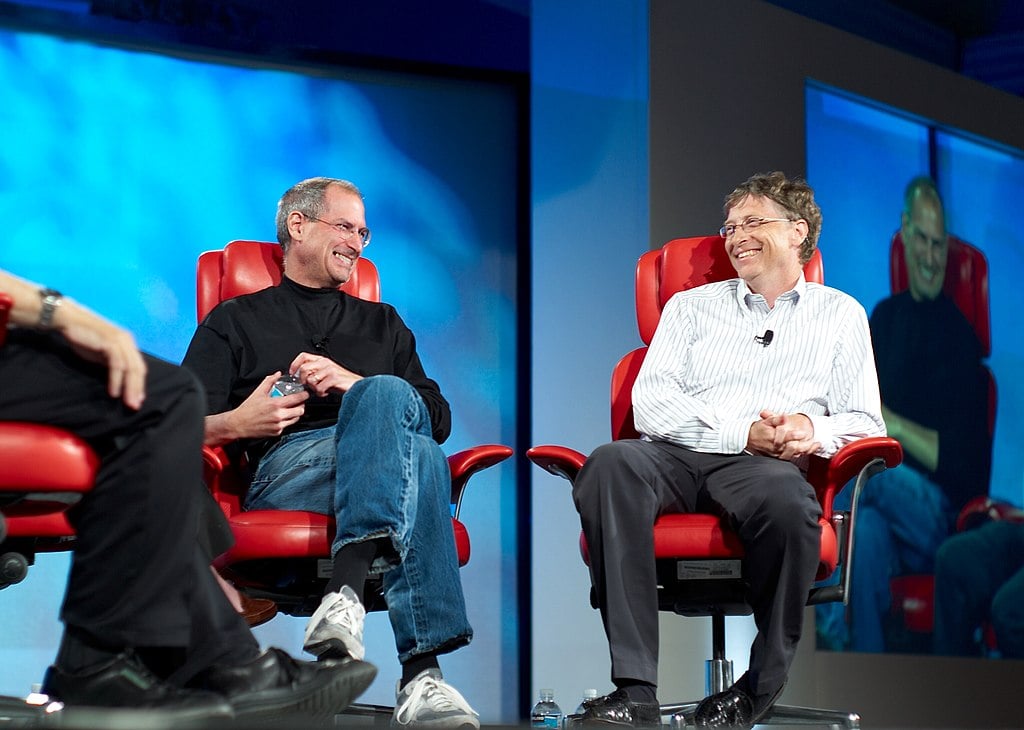Credit where it’s due for the generation that changed everything.

Before we dive into another round of generational warfare, let’s pause for a reality check. Sure, Boomers made their share of mistakes – what generation hasn’t. But dismissing everything they accomplished because of housing prices or climate change misses some pretty significant contributions that shaped the world we live in today.
The generation born between 1946 and 1964 lived through unprecedented social upheaval, technological revolution, and cultural transformation. While Gen Z rightfully calls out problems they inherited, they’re also benefiting from groundbreaking changes that Boomers fought to establish. Sometimes giving credit where credit is due isn’t about defending the past – it’s about understanding how progress actually happens.
1. Civil rights became their rallying cry for social justice.

Picture this scene from the 1960s when the oldest Boomers were barely out of their teens. Young people filled buses heading south for Freedom Rides, packed into churches for strategy meetings, and linked arms on bridges in Selma. While earlier generations laid the groundwork, Boomers provided much of the foot soldiers for the movement that dismantled legal segregation. According to research by civil rights organizations, thousands of college students participated in sit-ins, protests, and voter registration drives throughout the South.
Their activism didn’t end with symbolic gestures. These young protesters faced real consequences – arrest, expulsion from school, violence from police and civilians alike. Yet they persisted through the passage of the Civil Rights Act of 1964 and the Voting Rights Act of 1965. The infrastructure of social justice movements today, from grassroots organizing to nonviolent resistance tactics, bears the DNA of strategies that Boomers helped refine and implement during this transformative period.
2. Women’s liberation gained unstoppable momentum through their determination.

Boomers didn’t invent feminism, but they sure as hell mainstreamed it. The women of this generation refused to accept the limited roles their mothers had been offered, as stated by historians studying the women’s liberation movement of the 1960s and 1970s. They demanded access to previously male-dominated professions, fought for reproductive rights, and challenged workplace discrimination in ways that fundamentally altered American society.
The ripple effects continue today in boardrooms, classrooms, and courtrooms where women hold positions that would have been unthinkable just two generations ago. Boomer women pioneered the dual-career household, normalized working mothers, and created the legal frameworks that protect against gender discrimination. Their battles opened doors that younger generations now walk through without thinking twice about the locks that had to be broken.
3. Environmental consciousness emerged from their grassroots activism.

Something remarkable happened on April 22, 1970, when 20 million Americans participated in the first Earth Day. This wasn’t some top-down government initiative – it was organic, student-led environmental activism that forced politicians to pay attention, according to environmental historians documenting the birth of the modern ecological movement. Boomers transformed environmentalism from a fringe concern into mainstream political priority.
Their activism created the Environmental Protection Agency, the Clean Air Act, the Clean Water Act, and dozens of other pieces of legislation that literally cleaned up the air we breathe and water we drink. Before Boomer environmental activism, rivers caught fire, smog choked major cities, and industrial waste flowed freely into waterways. The environmental protections that Gen Z now takes for granted exist because Boomers made environmental degradation a political liability that politicians couldn’t ignore.
4. Technology revolution started with their entrepreneurial vision.

Here’s an uncomfortable truth for tech-native generations: Boomers invented the digital world you inhabit. Steve Jobs, Bill Gates, and Larry Ellison – all Boomers who transformed personal computing from science fiction into everyday reality. They didn’t just create products; they imagined entirely new ways of working, communicating, and accessing information that fundamentally restructured human society.
The internet, email, personal computers, mobile phones, and the basic software architecture underlying modern technology all emerged from Boomer innovation and entrepreneurship. While younger generations certainly perfected and miniaturized these technologies, the conceptual breakthroughs came from people who grew up without computers and had to imagine what they might become. That kind of visionary thinking laid the foundation for everything from social media to smartphones.
5. Higher education expanded access beyond traditional elites.

Boomers democratized college education in ways that reshaped American social mobility. The GI Bill helped their parents attend college, but Boomers extended that opportunity to women, minorities, and working-class families who had been systematically excluded from higher education for centuries. They demanded more diverse curricula, challenged discriminatory admissions practices, and created support systems for first-generation college students.
Student activism during the 1960s and 1970s transformed universities from exclusive finishing schools for the wealthy into engines of social mobility and intellectual diversity. The expansion of state university systems, community college networks, and financial aid programs that make higher education accessible today all emerged from Boomer advocacy for educational equity. Their insistence that college should be a right rather than a privilege created pathways that millions of subsequent students have followed.
6. Workplace culture shifted toward individual expression and flexibility.

Corporate conformity ruled American business until Boomers entered the workforce and began chipping away at rigid hierarchies and dress codes. They questioned why creativity should be stifled by bureaucracy, why good ideas should be ignored because of someone’s age or background, and why work had to be miserable to be productive. Their challenges to corporate culture planted seeds that eventually bloomed into modern workplace flexibility.
The casual Friday that became casual everyday, the open office concept, flex time, and even the basic idea that employees might have valuable input about company operations all trace back to Boomer workplace rebellions. They transformed the American office from a rigid, hierarchical environment where creativity was discouraged into something that at least attempted to value individual contribution and innovation. Modern workplace culture, for better or worse, reflects Boomer influence on organizational behavior.
7. Music and culture became vehicles for social change.

Woodstock wasn’t just a music festival – it was a cultural statement that reverberated through American society for decades. Boomer musicians and audiences used rock, folk, and soul music to challenge war, promote peace, and articulate visions of social transformation that mainstream politicians wouldn’t touch. Their cultural rebellion gave voice to dissent and made protest socially acceptable.
The integration of popular music with political activism created new forms of social engagement that persist today. From benefit concerts to protest songs, the template of using entertainment to promote social causes became standard practice because Boomers proved it could work. Their cultural innovations showed how art and activism could combine to create powerful movements for social change that reached beyond traditional political boundaries.
8. Consumer protection gained legal teeth through their advocacy.

Ralph Nader might be the most famous example, but he represented a broader Boomer movement that demanded accountability from corporations and government agencies. They refused to accept that consumers were powerless against dangerous products, misleading advertising, and corporate negligence. Their activism created legal frameworks that protect every American who buys products, uses services, or interacts with businesses.
The consumer protection laws that keep unsafe products off store shelves, require honest advertising, and provide legal recourse for fraud all emerged from Boomer advocacy efforts. They established the principle that businesses have obligations to their customers beyond simply making profit, and they created regulatory mechanisms to enforce those obligations. Modern consumer protection, from car safety standards to food labeling requirements, exists because Boomers made consumer rights a political priority.
9. Space exploration captured their imagination and funding.

The Apollo program that put humans on the moon happened because Boomers were young, enthusiastic supporters of space exploration who pressured politicians to fund ambitious scientific projects. Their generation provided the engineers, scientists, and public support that made the space program possible during an era when such expenditures faced significant political opposition.
NASA’s achievements during the 1960s and 1970s inspired generations of students to pursue careers in science, technology, engineering, and mathematics. The technological innovations developed for space exploration found their way into countless consumer products and industrial applications. The international cooperation that characterizes modern space exploration, from the International Space Station to Mars rovers, built on foundations that Boomers established when they made space exploration a national priority.
10. Health and fitness transformed from luxury to necessity.

Jogging was practically unknown in America until Boomers made it a national obsession. They popularized exercise, health food, and wellness practices that their parents’ generation viewed with suspicion. The fitness revolution that swept America in the 1970s and 1980s fundamentally changed how people thought about personal health and preventive medicine.
Yoga studios, health food stores, fitness centers, and the entire wellness industry that Gen Z embraces today all trace back to Boomer health consciousness. They rejected the sedentary lifestyle and processed food diet that had been normalized in the 1950s, instead embracing physical activity and nutritional awareness as essential components of a good life. Their health advocacy created the infrastructure that makes healthy living accessible and socially acceptable for subsequent generations.
11. Volunteerism and community service became generational values.

John F. Kennedy’s call to “ask what you can do for your country” resonated powerfully with young Boomers, who responded by creating a culture of volunteer service that continues today. The Peace Corps, VISTA, and countless community organizations benefited from Boomer enthusiasm for civic engagement and social service that extended far beyond traditional political participation.
Their volunteer efforts addressed problems that government programs couldn’t or wouldn’t tackle, from literacy education to environmental cleanup to poverty assistance. The nonprofit sector that provides essential services across America today was largely built by Boomer volunteers who believed that citizens had obligations to help their communities. Modern volunteer programs, from AmeriCorps to local food banks, operate using models that Boomers developed during their era of civic engagement.
12. Work-life integration began with their questioning of corporate priorities.

While Boomers are often criticized for being workaholics, they actually initiated the conversations about work-life balance that dominate modern employment discussions. They were the first generation to widely question whether climbing the corporate ladder was worth sacrificing family relationships, personal interests, and individual fulfillment. Their workplace rebellions opened discussions that younger generations continue today.
The flexible work arrangements, parental leave policies, and employee wellness programs that modern workers expect all emerged from Boomer challenges to traditional employment practices. They pioneered the idea that work should serve life goals rather than consume life entirely, and they created the precedents that allowed subsequent generations to demand even greater workplace flexibility and personal autonomy.
13. Global awareness expanded through their internationalism and travel.

Boomers were the first generation to embrace international travel, cultural exchange, and global perspective as normal parts of American life. They backpacked through Europe, studied abroad, joined the Peace Corps, and maintained pen pal relationships that connected them with people around the world. Their internationalism helped break down the insularity that had characterized earlier American generations.
This global consciousness influenced everything from cuisine to fashion to political awareness. The multiculturalism that characterizes modern American society, the international business relationships that drive the global economy, and the cross-cultural understanding that enables international cooperation all benefited from Boomer enthusiasm for engaging with different cultures and perspectives. They created the template for global citizenship that younger generations now take for granted.
14. Retirement planning became a personal responsibility they pioneered.

Traditional pension systems were already cracking when Boomers entered their peak earning years, forcing them to become the first generation to take primary responsibility for their own retirement security. They pioneered 401(k) plans, Individual Retirement Accounts, and the entire financial planning industry that helps people prepare for life after work. Their approach to retirement planning shifted from depending on employers and government to taking personal control of financial futures.
This transition wasn’t always smooth or fair, but it created the infrastructure that allows individuals to build wealth independently of their employers. The investment tools, retirement planning services, and financial literacy programs that younger generations use today all emerged from Boomer demands for better retirement options. They transformed retirement from something that happened to you into something you could actively plan and control, creating models for financial independence that continue to evolve.
